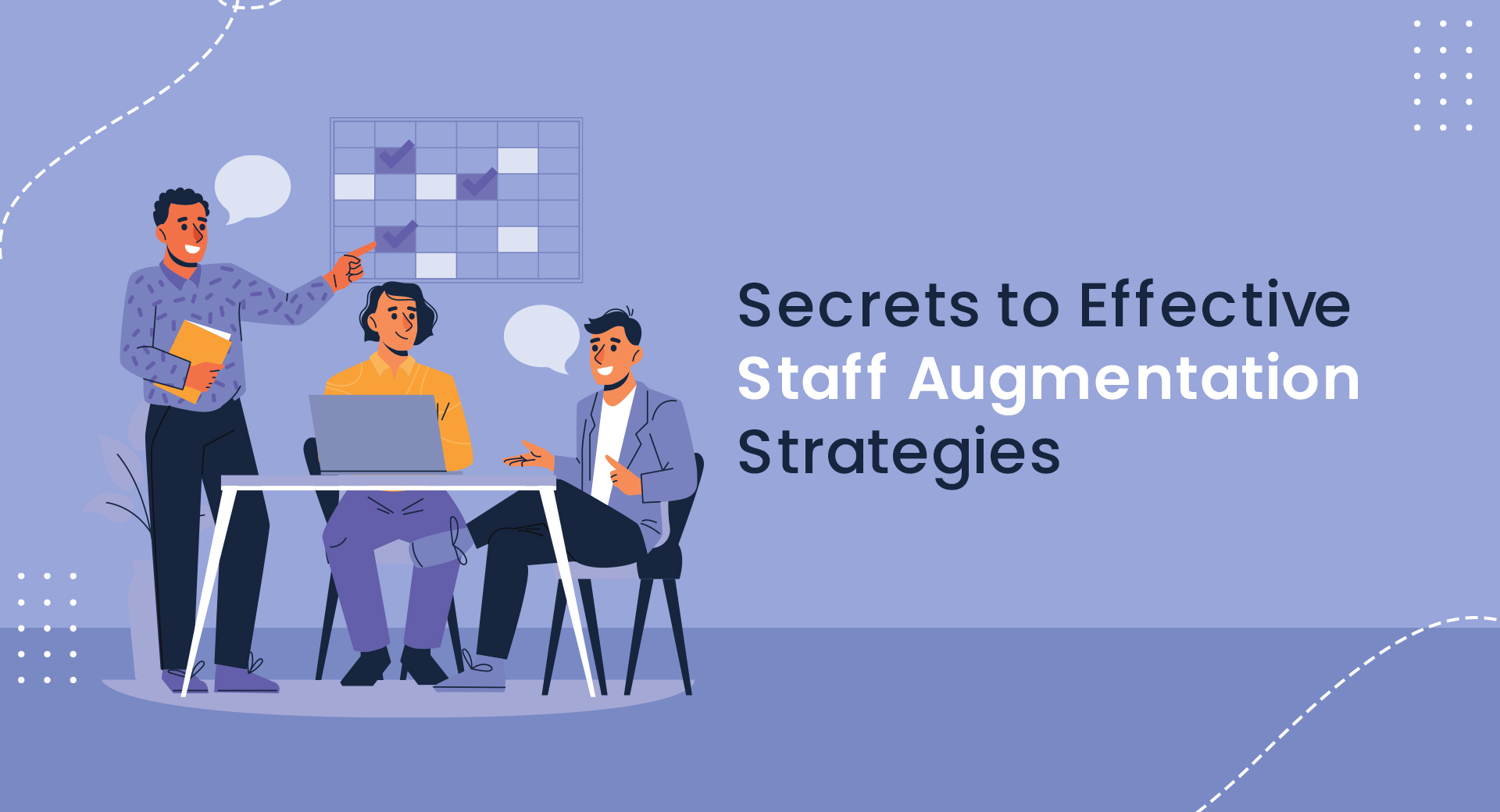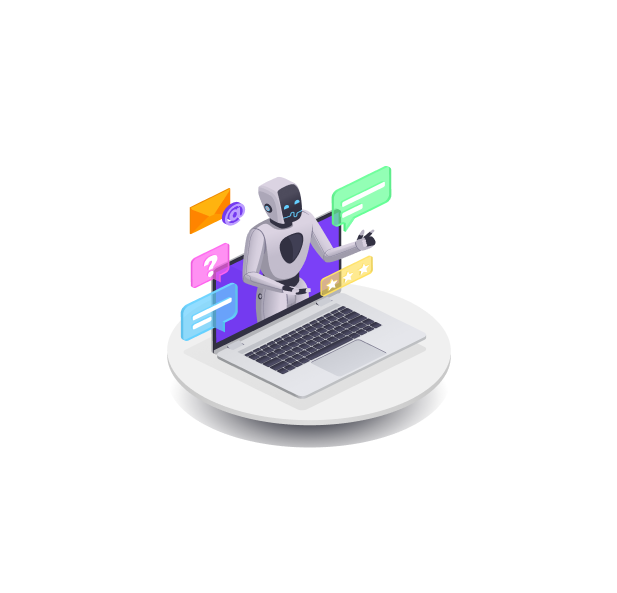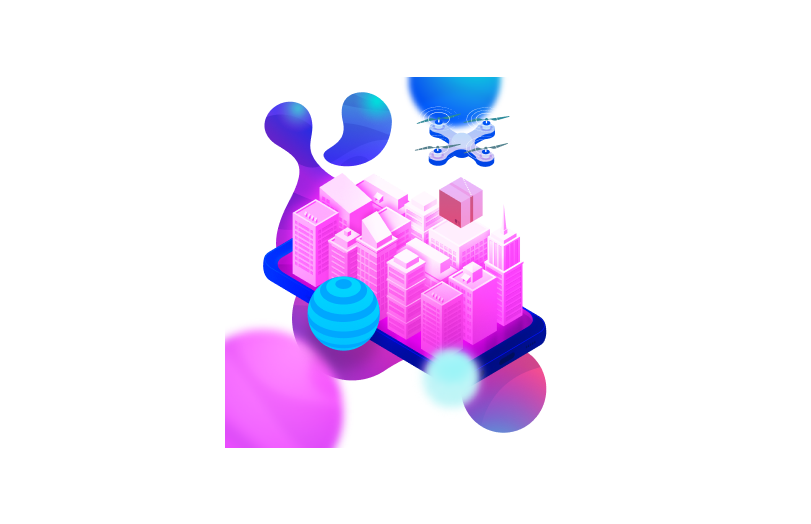In today’s competitive landscape, organizations use staff augmentation to optimize operations and stay ahead. This blog explores its benefits, use cases, and best practices for project success. Staff augmentation is an outsourcing model that supplements in-house teams with external resources temporarily, offering access to a global talent pool. It enables quick team scaling based on project needs and provides flexibility in resource allocation for short periods. Particularly useful for short-term roles, it allows companies to use temporary workers without long-term commitments, resulting in cost efficiency by avoiding recruitment and training expenses. It helps companies swiftly adapt to market changes by providing specialized skills when needed for successful project delivery.
Understanding Staff Augmentation in Agile Environments
In the fast-paced business world, agility is crucial for competitiveness. Traditional hiring processes can hinder project adaptability. Staff augmentation bridges talent gaps, saves time by avoiding new hires, and allows businesses to focus on their goals without expanding global tech talent. It adds external resources to in-house teams for specific project needs, providing quick access to skills without lengthy recruitment. This flexibility suits agile environments, allowing teams to scale as required for faster delivery and responsiveness to changing requirements.
This model is favored in software development for accessing specialized skills globally, ensuring better quality and faster delivery. It’s a cost-effective solution compared to hiring contract-based employees, valuable for companies in agile environments.
Effective project management is crucial in staff augmentation for agile environments. Tools like Jira, Trello, or Asana enhance collaboration and streamline workflows for efficient resource allocation and timely communication between teams. Additionally, external expertise helps teams adapt swiftly to project changes for successful delivery.
The Role of Agility in Modern Staff Augmentation
Agility is key in modern staff augmentation, aligning well with agile project management methodologies. This approach enables companies to respond swiftly to changing project needs and achieve better outcomes.
Augmented staff enhances teams with specialized skills on a project basis, optimizing resource allocation and efficiency. Tools like Jira, Trello, and Asana facilitate collaboration between augmented and in-house teams, offering flexibility in team management for project-based work. Ready-made teams with expertise are provided for short-term and long-term projects, enabling effective workforce scaling.
Further, by embracing agility, companies can achieve improved project outcomes, quicker delivery, and enhanced responsiveness to market demands. This empowers organizations to stay competitive and maximize the potential of staff augmentation.
Check out an article on Custom Software Development.
Key Benefits of Staff Augmentation Today
Staff augmentation provides various benefits for businesses today, including accessing a global talent pool, scaling teams based on project needs, cost efficiency, enhanced expertise, and flexibility. These advantages make it a valuable approach for organizations aiming to achieve their business goals efficiently.
Access to Global Talent
Staff augmentation provides companies with access to a global talent pool, allowing them to tap into a diverse range of technical expertise. Some benefits of accessing global talent through staff augmentation include:
- Wide range of technical expertise: Companies can find specialists in various fields and technologies to meet their specific project requirements.
- Broader talent pool: By expanding the search for talent beyond local markets, companies have a larger pool of qualified professionals to choose from.
- Cultural diversity: Leveraging global talent brings cultural diversity to the team, fostering creativity and innovation.
- Cost-effective solutions: Hiring remote developers or outsourcing tasks to countries with lower labor costs can provide cost savings for businesses.
Additionally, with this, companies can overcome geographical limitations and access the best talent from around the world, ensuring the success of their projects.
Scalability and Flexibility for Projects
It offers scalability and flexibility for projects, allowing companies to adjust team sizes based on project needs for efficient resource allocation. Key benefits include:
- Adaptable resource allocation: Companies can quickly adjust their team size and composition to match project demands, ensuring optimal resource allocation.
- Cost-effective scalability: Scaling up or down with augmented staff eliminates the need for long-term commitments or the cost of hiring and training full-time staff.
- Flexible project timelines: With staff augmentation, companies have the flexibility to extend or shorten project timelines based on available resources and project milestones.
- IT workforce optimization: It allows for the optimization of the internal IT workforce by supplementing it with specialized skills or temporary capacity.
Further, by leveraging scalability and flexibility, companies can optimize their project outcomes and effectively manage their IT workforce.
Cost Efficiency and Budget Control
Staff augmentation provides cost efficiency and budget control for businesses by hiring remote developers or outsourcing tasks. This approach helps save on recruitment costs and reduce overhead expenses. Benefits include:
- Reduced recruitment costs: Hiring full-time employees can be expensive and time-consuming. Staff augmentation allows companies to access skilled professionals without the upfront costs of recruitment.
- Lower overhead expenses: Companies can avoid the costs associated with providing office space, equipment, and benefits to full-time employees with augmented staff.
- Flexible budget allocation: Companies have more control over their budget by being able to scale their team size and duration based on project requirements.
- Cost-effective access to expertise: It enables companies to access specialized skills and expertise without the need for long-term commitments or costly training programs.
Moreover, by leveraging the cost efficiency and budget control of augmented staff, companies can optimize their resource allocation and achieve their project goals within budget.

When to Opt for Staff Augmentation
Staff augmentation is a suitable approach in several scenarios. Consider it when:
- Project-specific skill requirements: If your project requires specific skills that are not available within your existing team, staff augmentation can provide the necessary expertise.
- Enhancing team capacity for short-term needs: If you have a short-term project that requires additional resources, staff augmentation allows you to quickly augment your team on a temporary basis.
- Achieving faster project turnarounds: If you have tight project deadlines and need to accelerate development, it can provide a dedicated team to focus exclusively on your project.
Additionally, it offers the flexibility and scalability required to address specific project requirements and achieve project success.
Project-Specific Skill Requirements
Staff augmentation is an ideal solution when a specific project requires specialized skills that are not available within the existing team. Some advantages of staff augmentation for project-specific skill requirements include:
- Access to specialized expertise: It allows companies to tap into a wide range of specialized skills and technical expertise to meet the specific requirements of their project.
- Filling skill gaps: If there is a skill gap within the existing team, it can provide the necessary talent to bridge that gap and ensure project success.
- Efficient resource allocation: By augmenting the team with specialists who have the required skill set, companies can optimize resource allocation. Further, ensuring the project is completed successfully.
Lastly, this enables companies to address project-specific skill requirements and ensure the availability of the right talent for successful project execution.
Enhancing Team Capacity for Short-Term Needs
Staff augmentation is an effective solution for enhancing team capacity on a short-term basis. Some benefits of staff augmentation for short-term needs include:
- Rapid team augmentation: It enables companies to quickly augment their team with additional resources to meet short-term project requirements.
- Temporary capacity boost: If there is a surge in workload or a short-term project with a tight deadline, it provides the flexibility to scale the team up temporarily.
- Cost-effective solution: Hiring full-time employees for short-term needs can be expensive and impractical. It offers a cost-effective solution by providing skilled professionals temporarily.
In addition, by leveraging staff augmentation for short-term needs, companies can ensure the successful completion of projects within the required timeframe.
Achieving Faster Project Turnarounds
Staff augmentation accelerates project completion by assembling a dedicated team with the necessary skills, ensuring focused efforts and expedited delivery.
- Dedicated team: Staff augmentation allows companies to assemble a dedicated team focused solely on the project, ensuring faster progress and timely delivery.
- Specialized skills: By augmenting the team with specialists who have the necessary expertise, companies can overcome skill gaps and accelerate development.
- Efficient resource allocation: It enables companies to allocate resources specifically for the project, eliminating distractions and optimizing workflow.
By leveraging staff augmentation for faster project turnarounds, companies can meet tight deadlines and deliver high-quality results on time.
In addition, here’s an article about Augmented Reality in E-commerce: The Future of Shopping.
Best Practices in Implementing Staff Augmentation
Implementing staff augmentation effectively requires following best practices. Some key practices to consider include:
- Identifying the skills gap in your team: Before implementing staff augmentation, assess your team’s skill gaps and identify the specific expertise required for the project.
- Selecting the right partner: Choose a reliable staff augmentation partner who can provide the right talent and understand your project requirements.
- Integrating augmented staff into agile teams: Ensure smooth integration of augmented staff into your existing agile teams by fostering clear communication and collaboration.
By following these best practices, companies can maximize the benefits of staff augmentation and ensure successful project outcomes.
Identifying the Skills Gap in Your Team
Before implementing staff augmentation, it is essential to identify the skills gap in your existing team. Some steps to identify the skills gap include:
- Assessing existing staff skills: Evaluate the skills of your current team members and identify areas where additional expertise is required.
- Defining project requirements: Clearly define the project requirements and skills needed for successful project execution.
- Mapping required skills to available resources: Match the required skills to the skills available within your team and identify gaps that need to be filled through staff augmentation.
By identifying the skills gap in your team, you can effectively leverage it to bridge that gap and ensure project success.
Selecting the Right Staff Augmentation Partner
Choosing the right staff augmentation partner is crucial for successful project execution. Consider the following factors when selecting a staff augmentation partner:
- Cultural fit: Ensure that the staff augmentation partner’s values and culture align with your organization to foster a collaborative working relationship.
- Proven expertise: Look for a staff augmentation partner with a track record of providing the right talent and expertise for similar projects.
- Client references: Request client references and case studies to assess the staff augmentation partner’s performance and client satisfaction.
- Communication and collaboration: Evaluate the staff augmentation partner’s communication and collaboration processes to ensure smooth integration and efficient project management.
By selecting the right staff augmentation partner, companies can ensure they have access to the right talent and expertise for successful project execution.
Integrating Augmented Staff into Agile Teams
Integrating augmented staff into existing agile teams requires a focus on communication and collaboration. Some strategies for integrating augmented staff into agile teams include:
- Clear communication: Establish clear communication channels and expectations to ensure smooth collaboration between augmented staff and existing team members.
- Embrace agile practices: Ensure that augmented staff are familiar with agile methodologies and practices, and integrate them into the team’s agile processes.
- Assign a dedicated mentor: Assign a mentor from the existing team to provide guidance and support to the augmented staff. It helps them quickly adapt to the team’s dynamics and workflows.
By prioritizing communication, embracing agile practices, and providing mentorship, companies can effectively integrate augmented staff into their existing agile teams.
Overcoming Challenges in Staff Augmentation
While staff augmentation offers numerous advantages, there are also challenges that companies may face. Some common challenges in staff augmentation include:
- Smooth communication and collaboration: Ensuring effective communication and collaboration between augmented staff and in-house teams can be challenging, especially with language barriers or different time zones.
- Maintaining project visibility and control: Providing project visibility and maintaining control over the project can be challenging when working with augmented staff who are remote or from different organizations.
- Addressing cultural fit and team dynamics: Integrating augmented staff into existing teams can be challenging in terms of cultural fit and team dynamics.
By being aware of these challenges and implementing strategies to address them, companies can overcome obstacles. In addition, ensure successful project outcomes in staff augmentation.
Ensuring Smooth Communication and Collaboration
Smooth communication and collaboration are essential for successful staff augmentation. Some strategies to ensure smooth communication and collaboration include:
- Establish clear communication channels: Set clear channels of communication, such as using project management tools like Slack or Microsoft Teams. Help facilitate effective communication between augmented staff and the in-house team.
- Provide regular updates: Regularly update the augmented staff and the in-house team on project progress, milestones, and any changes or updates.
- Encourage open communication: Foster an environment of open communication where team members feel comfortable sharing ideas, asking questions, and providing feedback.
- Manage language barriers: If language barriers exist, provide language support or translation services to ensure effective communication between team members.
By prioritizing smooth communication and collaboration, companies can overcome challenges and ensure successful outcomes.
Maintaining Project Visibility and Control
Maintaining project visibility and control is crucial in staff augmentation. Some strategies to ensure project visibility and control include:
- Establish clear project goals and milestones: Clearly define project goals and milestones at the outset. Further, providing a roadmap for the project and ensuring everyone is aligned.
- Assign a dedicated project manager: Assign a project manager who can oversee the project, coordinate tasks, and ensure that project goals are being met.
- Regular status updates: Provide regular status updates to the project manager and the in-house team. This ensures every one of the project’s progress and any potential issues.
- Implement project tracking tools: Utilize project tracking tools, such as project management software or task management tools. This helps you to track progress, monitor timelines, and ensure project visibility.
By maintaining project visibility and control, companies can effectively manage projects and ensure successful outcomes.
Addressing Cultural Fit and Team Dynamics
Addressing cultural fit and team dynamics is crucial when integrating augmented staff into existing teams. Some strategies to address cultural fit and team dynamics include:
- Assess cultural compatibility: Assess the cultural compatibility of augmented staff by considering factors such as values, work ethic, and communication style.
- Team-building activities: Organize team-building activities or events to promote interaction and collaboration among augmented staff and the existing team.
- Encourage open communication: Foster an environment of open communication where team members feel comfortable sharing their perspectives and ideas.
- Promote inclusivity: Ensure that augmented staff are fully integrated into the team and have equal opportunities for growth and development.
By addressing cultural fit and team dynamics, companies can build cohesive teams that work collaboratively to achieve project success.
Future of Staff Augmentation in Agile Environments
Staff augmentation will play a crucial role in agile environments as businesses increasingly adopt agile methodologies. It offers the flexibility and scalability needed to meet evolving project requirements. Trends and predictions for staff augmentation in agile environments include:
- Increased use of AI and automation: AI and automation technologies will be integrated into staff augmentation processes. Further, streamlining talent sourcing, and matching processes.
- Rise of remote work: Remote work will become more prevalent, enabling companies to access global talent without geographical limitations.
- Focus on soft skills: Soft skills, such as communication and collaboration, will become increasingly important. Teams become more diverse and distributed.
- Enhanced technology integration: Staff augmentation will leverage advanced technology integration. Like, virtual reality and augmented reality, to facilitate remote collaboration and deliver immersive training experiences.
The future of staff augmentation in agile environments will involve technology integration and remote work opportunities. Further, this involves an emphasis on soft skills. Embracing these trends can help companies optimize project outcomes.
Trends and Predictions for Staff Augmentation
In staff augmentation, emerging trends are reshaping the landscape. Businesses are leveraging global talent pools, integrating technology seamlessly, and adapting to evolving workforce dynamics. Augmented staff will collaborate more effectively in agile teams, boosting productivity. Resource augmentation will be crucial as project requirements change, meeting modern business needs. Exciting developments lie ahead in staff augmentation.
Leveraging Technology for Better Integration
Leveraging technology is key to achieving better integration in staff augmentation. Some ways companies can leverage technology for better integration include:
- Virtual collaboration tools: Utilize virtual collaboration tools, such as video conferencing platforms or project management software. This helps to facilitate seamless communication and collaboration between augmented staff and in-house teams.
- Cloud-based systems: Adopt cloud-based systems for file sharing and project management to ensure real-time access. This helps to get project-related information and streamline workflows.
- Collaborative platforms: Implement collaborative platforms that enable augmented staff and in-house teams to work together efficiently. In addition, share knowledge, and track project progress.
- Automation and AI: Incorporate automation and AI technologies into staff augmentation processes. For instance, AI-powered talent matching or automated onboarding, to enhance efficiency and effectiveness.
By leveraging technology, companies can overcome integration challenges and foster a more seamless and collaborative work environment.
Conclusion
In conclusion, staff augmentation offers unparalleled advantages in today’s agile environments. From accessing global talent to enhancing project scalability and maintaining cost efficiency, the benefits are vast. Opting for augmented staff when facing skill gaps or short-term capacity needs ensures faster project turnarounds. By implementing best practices like identifying skills gaps and selecting the right partner, you can overcome challenges seamlessly. Embracing the future of this involves leveraging technology for smoother integration. To unlock these benefits today, get in touch with us for expert guidance.




[…] out an article on Secrets to Effective Staff Augmentation Strategies to grasp the concept of it […]
[…] make a staff augmentation a success, you require effective staff augmentation strategies. Here’s some key steps to consider to manage augmented staff for your business for optimal […]